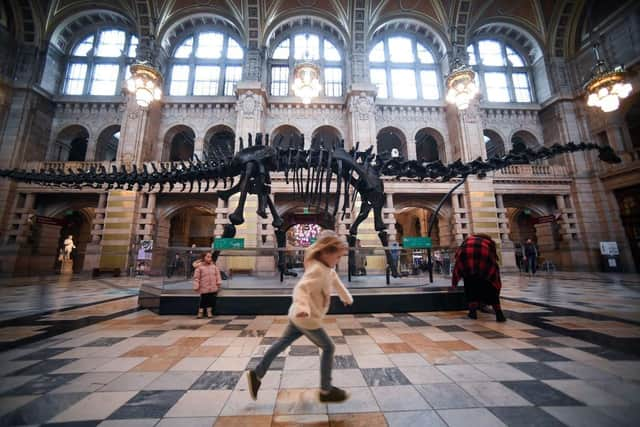Glasgow Council has questions to answer over sale of the city's crown jewels – Martyn McLaughlin
For the past five years, the local authority has committed itself to righting a historic wrong by finding a way to raise hundreds of millions of pounds in order to settle a longstanding equal pay claim brought by thousands of female staff.
The SNP took control of Scotland’s biggest city having pledged to settle once and for all an issue rooted in a discriminatory pay and grades structure implemented 16 years ago by the then Labour administration, and it has made commendable progress.
Advertisement
Hide AdAdvertisement
Hide AdFinding upwards of half a billion pounds at any time, let alone in the midst of the current financial climate, is a major undertaking, but Susan Aitken, the council leader, correctly calculated that the cost of continuing to undervalue and discriminate against the many women who provide lifeline services was infinitely greater. For that, she deserves praise.


Yet squaring that circle has been a long and painful pursuit. It quickly became clear that neither the Treasury nor the Scottish Government were able, or willing, to lend the money, and the council ruled out rasher courses of actions seen elsewhere, such as Birmingham’s decision to flog off the National Exhibition Centre – a lynchpin of the West Midlands economy – to the private equity arm of Lloyds.
But no matter the ingenuity of its solution, Glasgow could never have its cake and eat it. Which is why the council’s depiction of the way it is financing the latest round of compensation offers is, at best, disingenuous.
Last week, it announced that it is embarking on a “sale and leaseback arrangement” covering some of the city’s most prized assets, including William Young’s imposing City Chambers, Kelvingrove Art Gallery and Museum, and the Gallery of Modern Art.
The council explained that one of its numerous arms-length external organisations (ALEOs) will borrow to purchase the buildings, before leasing them back. “Releasing the potential of our property, while keeping it in the city’s ownership, at least protects services and the future of these valued assets,” reasoned Ms Aitken.
That line was subsequently echoed far and wide by her colleagues. The SNP’s Allan Casey said the properties had been “protected” and “remain in the city’s ownership”, while two other councillors – Ruari Kelly and Paul Leinster – characterised the process as remortgaging.
None of which is true. The buildings are not being remortgaged, they are being sold, and their new owner will be the snappily named limited liability partnership, City Property Glasgow (Operations SL3).
Ms Aitken and others would no doubt point out that this is an exercise in semantics, and that 99.999 per cent of the shares in the new entity will be owned by the council, with the remaining 0.001 per cent held by City Property (Glasgow) LLP.
Advertisement
Hide AdAdvertisement
Hide AdThis is correct. But it obscures a vital point; those valued assets will be used as security against an estimated £200m in external financing.
It echoes the similar leaseback struck by the council in 2019, which released the equity in a string of world-class sporting and cultural venues, including the Emirates Arena and the Riverside Museum, in return for a funding windfall.
Back then, two special-purpose subsidiaries were spun out from City Property (Glasgow) to secure £285m from LGIM Commercial Lending Limited, part of Legal & General, £166m from Canada Life Asset Management Limited, and £195m from Assured Guaranty.
In turn, the council agreed to a commercial rent deal with the ALEO that will see it pay nearly £20.4m in annual lease agreements, with that money being used to meet the debt repayments to LGIM, Canada Life, and Assured Guaranty. Those two special-purpose subsidiaries have a total of 18 charges – essentially securities given for a loan, such as a mortgage – registered against them, ranging from floating charges to standard securities.
It is, in theory, a smart and inventive way to obtain financing, but it is risky, and there are several searching questions the council has yet to answer about the 2019 arrangement, let alone the recently announced one.
Given the ruinous impact of the pandemic on the economy and the turmoil in global bond markets, the most obvious query concerns the terms of the new deal.
Pauline Barclay, City Property Glasgow’s managing director, enjoyed a dinner at The Ivy earlier this year, with Legal & General picking up the bill. Perhaps they were discussing an agreement. If so, the city’s taxpayers must hope it proves as agreeable as the arancini al tartufo.
More important is a question posed astutely by Scott Wortley, a commercial law lecturer at the University of Edinburgh: what happens to these cherished properties if City Property (Glasgow) and its entities default on their repayments?
Advertisement
Hide AdAdvertisement
Hide AdA worrying clue can be found in the standard security between City Property Glasgow (Operations SL2) LLP and Canada Life over the Emirates Arena; in the event of a continuing default, Canada Life can immediately enforce any part of the security, in a manner and on the terms that it deems fit.
Ms Aitken might insist such deals protect the future of these buildings, but that is entirely dependent on the fiscal health of the council and its ALEOs. The precarious state of local government funding means the diagnosis is far from certain.
The most recent accounts for City Property (Glasgow LLP) show it is running at a loss, and the current economic uncertainty means it cannot be assured the same healthy capital receipts from surplus property disposals that it has previously enjoyed.
None of these questions should cast doubt on the principles behind the council’s decision to deliver justice to women employees who were treated like second-class citizens. But in claiming nothing is being sold, and nothing is at risk, it is being far from sincere.
Comments
Want to join the conversation? Please or to comment on this article.
